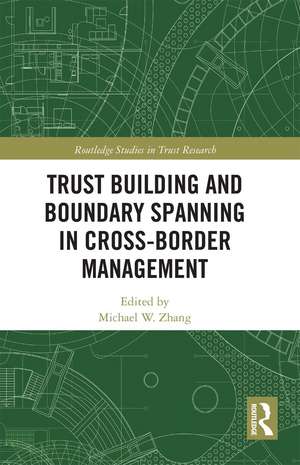Trust Building and Boundary Spanning in Cross-Border Management: Routledge Studies in Trust Research
Editat de Michael Zhangen Limba Engleză Paperback – 18 dec 2020
Research in organisation behaviour indicates that boundary spanners play critical yet unspecified roles and functions in managing cross-boundary relationships. A core boundary spanning function is to build trust relationships. When organisations engage in business transactions, members of the organisations are concerned with not only the outcomes of economic transactions but also the processes of social exchanges. Boundary spanners may succeed in building interpersonal trust in a partnership, nonetheless their effort may not lead to inter-partner trust without an effective implementation of the institutionalisation process. Whereas trustworthiness is the antecedent to trust providing the basis for trust to develop, distrust manifests itself as a separate and linked concept to trust. These dynamic features of trust, trustworthiness, and distrust are critically elaborated.
Trust Building and Boundary Spanning in Cross-Border Management is dedicated to explicating these under-researched themes and contributing to the emerging streams of research in micro foundations and micro-structural approaches. It illustrates the latest research on the topic and will be of interest to both students at an advanced level, academics and reflective practitioners in the fields of organisational behaviour and theory, strategic management, international strategy and strategic alliances.
| Toate formatele și edițiile | Preț | Express |
|---|---|---|
| Paperback (1) | 260.33 lei 6-8 săpt. | |
| Taylor & Francis – 18 dec 2020 | 260.33 lei 6-8 săpt. | |
| Hardback (1) | 821.96 lei 6-8 săpt. | |
| Taylor & Francis – 13 mar 2018 | 821.96 lei 6-8 săpt. |
Din seria Routledge Studies in Trust Research
- 9%
 Preț: 936.53 lei
Preț: 936.53 lei -
 Preț: 311.78 lei
Preț: 311.78 lei -
 Preț: 384.59 lei
Preț: 384.59 lei -
 Preț: 389.66 lei
Preț: 389.66 lei -
 Preț: 389.66 lei
Preț: 389.66 lei - 9%
 Preț: 934.94 lei
Preț: 934.94 lei - 18%
 Preț: 997.58 lei
Preț: 997.58 lei -
 Preț: 389.66 lei
Preț: 389.66 lei -
 Preț: 389.66 lei
Preț: 389.66 lei - 18%
 Preț: 951.83 lei
Preț: 951.83 lei - 18%
 Preț: 950.40 lei
Preț: 950.40 lei - 9%
 Preț: 936.64 lei
Preț: 936.64 lei - 18%
 Preț: 1008.86 lei
Preț: 1008.86 lei - 18%
 Preț: 999.19 lei
Preț: 999.19 lei - 25%
 Preț: 824.53 lei
Preț: 824.53 lei - 18%
 Preț: 1113.95 lei
Preț: 1113.95 lei
Preț: 260.33 lei
Preț vechi: 319.19 lei
-18% Nou
Puncte Express: 390
Preț estimativ în valută:
49.81€ • 51.91$ • 41.25£
49.81€ • 51.91$ • 41.25£
Carte tipărită la comandă
Livrare economică 03-17 aprilie
Preluare comenzi: 021 569.72.76
Specificații
ISBN-13: 9780367735111
ISBN-10: 0367735113
Pagini: 252
Dimensiuni: 152 x 229 mm
Greutate: 0.47 kg
Ediția:1
Editura: Taylor & Francis
Colecția Routledge
Seria Routledge Studies in Trust Research
Locul publicării:Oxford, United Kingdom
ISBN-10: 0367735113
Pagini: 252
Dimensiuni: 152 x 229 mm
Greutate: 0.47 kg
Ediția:1
Editura: Taylor & Francis
Colecția Routledge
Seria Routledge Studies in Trust Research
Locul publicării:Oxford, United Kingdom
Public țintă
PostgraduateCuprins
Chapter 1
Introduction: Trust-building and Boundary-spanning in Cross-border Management
Michael Zhang
Part I Conceptual Development
Chapter 2
Trust and Distrust – The Microstructural Ties Connecting Cross-border Inter-partner Relationships
Michael Zhang
Chapter 3
Boundary Spanning in ISAs: A Trust Perspective
Michael Zhang and Paul Gooderham
Part II Trust building through boundary spanning
Chapter 4
Trust-building and Boundary-spanning in Global Collaborations
Thomas Tøth and Anne-Marie Søderberg
Chapter 5
Personal Attachment of Boundary Spanners in ISAs: A Two-sided Coin
Franziska Engelhard and Robin Pesch
Chapter 6
Building Trust across International Boundaries: The Founder’s Role in Consulting Firm’s Early Development
Murray Taylor, Jarryd Daymond and James Willard
Chapter 7
Trust in Global Value Chains and the Role of Intermediaries
Alessandro Perri and Nancy Buchan
Part III Boundary Spanning from a trust perspective
Chapter 8
Micro-foundation Thinking in Alliance Learning: Role of Boundary Spanners’ Theory of Mind
Xinlu Qiu and Sven Haugland
Chapter 9
Restoring Trust through Isomorphism at MFIs: Trustworthiness and Boundary Permeability
Robert Swalef and Michael Zhang
Chapter 10
Spanning the Boundary of Organisations: A Systematic Review of the Inter-Organisational Boundary Spanning Literature
Ryan Tang, Xinlu Qiu and Michael Zhang
Chapter 11
Concluding Summary: Linking Micro-structural Approach with Systems Theory
Michael Zhang
Introduction: Trust-building and Boundary-spanning in Cross-border Management
Michael Zhang
Part I Conceptual Development
Chapter 2
Trust and Distrust – The Microstructural Ties Connecting Cross-border Inter-partner Relationships
Michael Zhang
Chapter 3
Boundary Spanning in ISAs: A Trust Perspective
Michael Zhang and Paul Gooderham
Part II Trust building through boundary spanning
Chapter 4
Trust-building and Boundary-spanning in Global Collaborations
Thomas Tøth and Anne-Marie Søderberg
Chapter 5
Personal Attachment of Boundary Spanners in ISAs: A Two-sided Coin
Franziska Engelhard and Robin Pesch
Chapter 6
Building Trust across International Boundaries: The Founder’s Role in Consulting Firm’s Early Development
Murray Taylor, Jarryd Daymond and James Willard
Chapter 7
Trust in Global Value Chains and the Role of Intermediaries
Alessandro Perri and Nancy Buchan
Part III Boundary Spanning from a trust perspective
Chapter 8
Micro-foundation Thinking in Alliance Learning: Role of Boundary Spanners’ Theory of Mind
Xinlu Qiu and Sven Haugland
Chapter 9
Restoring Trust through Isomorphism at MFIs: Trustworthiness and Boundary Permeability
Robert Swalef and Michael Zhang
Chapter 10
Spanning the Boundary of Organisations: A Systematic Review of the Inter-Organisational Boundary Spanning Literature
Ryan Tang, Xinlu Qiu and Michael Zhang
Chapter 11
Concluding Summary: Linking Micro-structural Approach with Systems Theory
Michael Zhang
Notă biografică
Michael Wei Zhang is a Reader in International Strategy in the Nottingham Business School at Nottingham Trent University, UK.
Descriere
Trust Building and Boundary Spanning in Cross-Border Management is dedicated to addressing these under-researched themes and contributing to the emerging streams of research in micro foundations and role-based organization theory. It illustrates the latest research on the topic and will be of interest both to students at an advanced level
